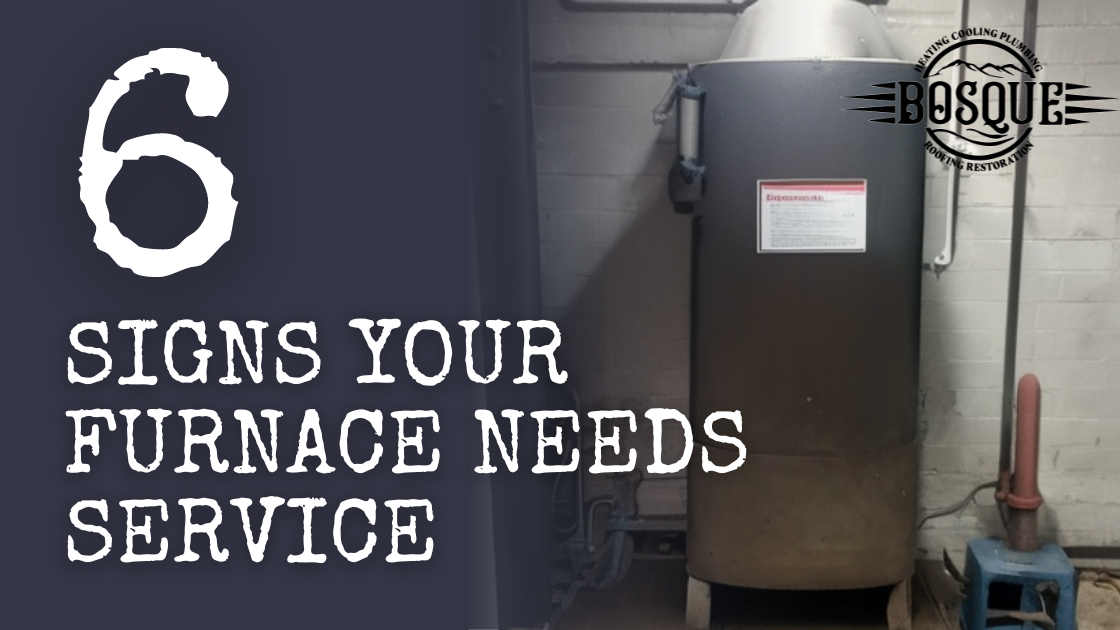Signs Your Furnace Needs Repair or Replacement
It’s winter here in Albuquerque, and the last thing you want is for your furnace to start acting up. Whether you’re hearing weirds sounds, noticing quirky cycles, or seeing a big jump in your heating bill—don’t panic just yet.
In this blog, we’re going to fill you in on how to determine whether or not your furnace can be fixed or needs to be replaced. We won’t bury the lede though—it really is all going to depend on the age of your furnace.
If it’s old, it will likely need to be replaced. If it’s just acting wonky it can typically be repaired or recalibrated.
How to Troubleshoot Whether You Need to Replace Your Furnace
The very biggest factor in whether or not you’re going to need to replace or if you can repair your furnace is the age of your furnace.
Unfortunately, like every appliance you own, furnaces don’t live forever. Their average lifespan is around 15-20 years. Having said that, a well maintained furnace can last more much longer—but more on that later.
The scary thing about an older furnace is that it can begin to release carbon monoxide into your home at a rate that’s undetectable to a home carbon monoxide detector. So, many HVAC specialists will recommend you replace your furnace as it reaches the end of its lifespan but before you have total furnace failure.
Carbon monoxide is not something you want to mess around with, and a carbon monoxide detector in the home only picks up on carbon monoxide at very dangerous to deadly levels. But carbon monoxide poisoning can negatively affect you far before a detector can pick it up.
So, if your furnace is nearing 15 years old or older and it’s acting up, it’s definitely time to consider replacement. But if your furnace is broken and you’ve only had it a handful of years, it can likely be fixed. Here are the top 6 signs your furnace need service.
6 Signs Your Furnace Needs Service
If you’re noticing one of the following things and your furnace is not at the end of its lifespan, it’s likely it can be fixed. Here’s what to look (or listen, or smell) for:
Your heating bill suddenly goes up.
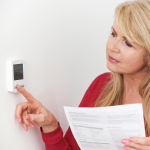
If your heating bill suddenly goes up, it’s not time to panic just yet. First, check your bill to see if it does a cost comparison of the cost of gas last year and the cost of gas this year. Sometimes there are fluctuations in the cost of natural gas, and if if you have a gas furnace, it may just be that you’re experiencing an unfortunate increase in utility costs.
But, if your bill doesn’t explain the increase, it could be that your furnace is working harder than it needs to due to a dirty filter or malfunctioning part.
One common problem that causes a spike in energy bills is if you have a leak in your ductwork. You may be able to self-diagnose this is you can hear a leak in any of your exposed ductwork. Or an HVAC specialist can help diagnose and then fix the leaks.
Like we briefly mentioned, another cause would be if you have an extremely dirty air filter. If air is having a hard time flowing through the air filter, that can cause your HVAC system to work harder than usual, causing your bill to spike. That is an easy fix you can do on your own! Change out the filter and see if that helps.
Your furnace cycles on and off frequently.
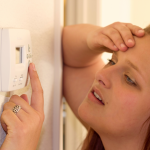
If you notice your furnace cycles off and on frequently and the heating cycle is extremely short, that’s called short
cycling. There are a number of things that can cause your furnace to short cycle. The main cause is obstructed air flow. Before you call a HVAC repair service, check the following things.
- Check to see if the furnace filter is too clogged and blocking the air flow. If so, just replace it.
- Evaluate if you’ve moved any furniture in a way that are blocking the vents. A room can only heat to a certain point if furniture is preventing the air from flowing freely into the room. If you have cold spots in a room, that’s also a good sign that furniture could be the problem.
If you change the air filter and shift around furniture, and you still notice the short cycling, it might be that your furnace itself is overheating.
This happens when there is too much wear and tear on parts and they aren’t functioning properly. and it can also happen when air flow is blocked. And, this is a good time to call a HVAC company so they can diagnose why your furnace is short cycling.
Your furnace makes (loud) banging or gurgling sounds.

There are many reasons why your furnace might be making loud noises, and some noises are certainly normal, especially when a heating cycle begins. But if you notice noises out of the ordinary, these noises might be warning signs that something is not right.
Strange noises could be warning signs of a dirty burner that’s delaying the ignition. That’s not something you want to ignore, since it could result in carbon monoxide poisoning .
Gurgling sounds could mean trouble with your condensation pipe. This is likely a furnace problem that will need a service call from a professional to address.
Your furnace smells funny.

If your furnace is emitting weird smells, it’s important to pay attention to that. Remember—carbon monoxide is a
common fear but it is odorless. So if it was carbon monoxide, warning signs would not be a smell. Rather, warning signs would be flu like symptoms, dizziness, and confusion.
Common smells you might notice would be musty or dusty smells, rotten eggs, or burning plastic.
A burning plastic smell means you should turn off your furnace and call an HVAC tech right away. Your furnace can likely be repaired, but the smell could be coming from burning wires that you don’t want to mess with.
Musty smells could mean mold is growing somewhere in the heating system, and you’re going to need an HVAC tech to take a look to find the source. But dusty smells are nothing to worry about, especially at the very beginning of the season when you’re turning your furnace on for the first time of the season.
Lastly, a rotten egg or sewer smell could mean a failed heat exchanger. This can be repaired, but you should turn your furnace off and get service right away, since a cracked heat exchanger can pump carbon monoxide into the home.
You have neglected regular maintenance.
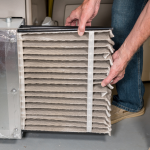
If your furnace is acting up but it’s not old enough to need to be replaced, you ought to evaluate how often you have it serviced.
Like a car, furnaces need regular maintenance, usually once a year before the heating season begins. Spring maintenance can also address any breakdowns that happened over the season and an HVAC tech will clean the system parts to ensure you don’t have furnace problems in the following fall.
If regular maintenance hasn’t been on your radar, it’s time to start. Furnaces that haven’t had regular maintenance are will need to be replaced sooner. But, if you start regular maintenance, you can prolong the life of your furnace and prevent the need for emergency furnace repair.
Your furnace is less than 15 years old.
The number 1 reason that your furnace would need replacement over repair is simply the age of the heating system. As we’ve mentioned, furnaces are only built to last 15-20 years.
Sure, you’ve probably heard that story of your Great Aunt Sally who’s furnace lasted 50 years. But that’s really not the norm, and in fact, it’s risky because of the potential of a carbon monoxide leak. It’s best to be proactive. Check with your trusted HVAC specialist and get their opinion.
Keep in mind, getting a new heating system could reduce heating costs (more energy efficient models available now that 20 years ago,) give you peace of mind, and increase the value of your home if you’re thinking about selling anytime soon.
How Do I Know If I’ll Need a Furnace Replacement?

Truly, the main factor to whether or not you’ll need a furnace replacement is the age of your furnace. If your furnace
is earlier in its lifespan, things like short cycling, strange smells, weird noises, and even an increase in your heating bill can likely all be fixed with furnace repair.
The best thing to do is to call your trusted HVAC specialist at Bosque Heating, Cooling and Plumbing and let us come out to your home and take a look. We’ll be honest with you and let you know if repairs can be made and when to expect that you’ll need a replacement.
